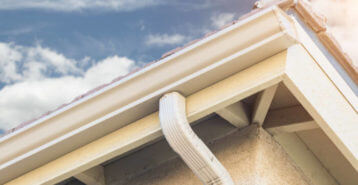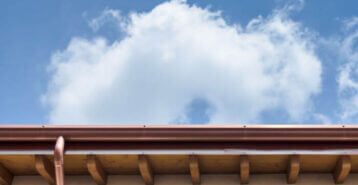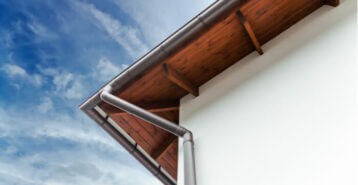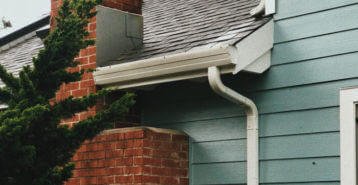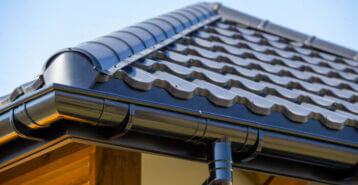Vinyl Rain Gutters: A Guide
Installing vinyl gutters is an affordable way to protect your home from costly water damage, foundation issues, and exterior wear and tear. As one of the most budget-friendly gutter options, vinyl is popular among homeowners looking for a simple, lightweight, and low-maintenance solution. However, costs can vary significantly based on factors like home size, material quality, installation complexity, and labor rates in your area.
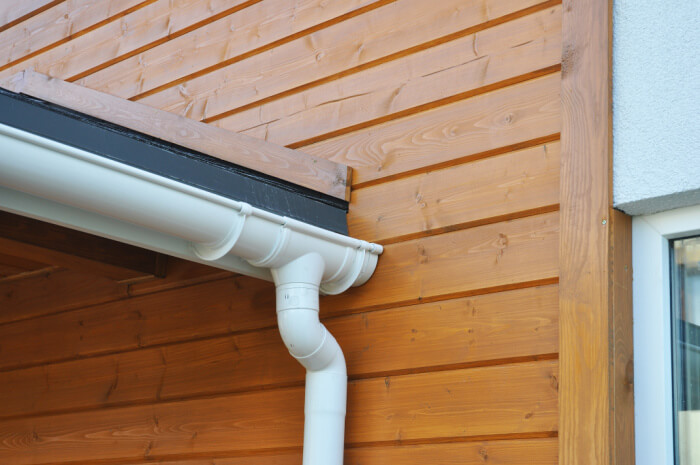
How Much Does it Cost to Install Vinyl Gutters?
The average cost to install a gutter system is largely dependent on several factors, including:
- Square footage of your home
- Number of stories of your home
- The type of gutters and their style
- Other gutter system parts, such as downspouts and gutter guards
- Labor and installation rates in your area
Vinyl gutters have an average cost of $6.33 to $32.40 per linear foot, depending on factors like quality, home size, and location. Most U.S. homes require 100 to 200 linear feet of new guttering, while larger homes may need 250 to 300 linear feet or more. In addition to the cost of the gutters, professional installation and labor typically range from $3.25 to $15.75 per linear foot. When factoring in both materials and labor, the national average cost for installed vinyl gutters is $28.87 per linear foot.
You will also need vinyl downspouts to properly direct rainwater away from your home. Each vinyl downspout costs between $58 and $105, with labor adding an additional $24.40 to $44.50 per unit. This brings the total cost per downspout to $82.40 to $149.50 on average. Most homes require two to four downspouts, but the exact number depends on home size and roof design.
Additional accessories, such as gutter guards and end caps, will likely be required during installation as well. You can get a better sense of what you will pay to install PVC gutters by checking the table below.
| Component | Average cost |
|---|---|
| Vinyl PVC gutters | $6.33 - $32.40 per linear ft. |
| Vinyl downspouts | $82.40 to $149.50 per unit |
| Vinyl end caps | $2 - $6.25 per unit |
| Vinyl gutter guards | $2.30 to $4.20 per linear ft. |
| Labor and installation | $3.25 - $15.75 per linear ft. |
| Estimated grand total for 2,500 sq. ft. home | $1,979 - $14,560 |
Benefits of Vinyl Gutters
There are many reasons why homeowners are choosing vinyl gutters for their homes today. Although aluminum gutters are the most common for homes in the U.S., you may opt for vinyl gutters over other types due to the following benefits.
Low Cost
Vinyl gutters have become a popular option for many homeowners, thanks in part to their low cost. They are most commonly made with polyvinyl chloride (PVC), an inexpensive type of lightweight plastic. At an average national installation cost of just $6.33 to $32.40 per linear foot, which includes both materials and labor costs, vinyl gutters are often the most affordable option available for gutter replacements.
Easy Installation
Cost is not the only factor in homeowners opting for vinyl gutters. They are also easy to install thanks to this lightweight material. This helps reduce the gutter installation and labor costs, as PVC gutters often have a quicker installation time compared to heavier materials, like copper or steel.
Less Strain on Your Roof
The lightweight nature of vinyl gutters also means that mounting structures connecting gutters to your home will have lower load-bearing capacity since they won’t need to hold as much weight. This can lessen the strain on your roof.
Low Maintenance
Finally, vinyl gutter popularity is tied to the fact that they do not typically require much maintenance. They do not rust or corrode and hold up well to dents and dings.
Vinyl vs. Aluminum Gutters
Vinyl and aluminum are two of the most common gutter materials, each offering distinct advantages. While both are affordable and easy to install, aluminum gutters are more durable and widely used — accounting for about 70% of all U.S. homes. If you’re comparing the two options, it’s important to consider factors like cost, longevity, installation, appearance, and sustainability. Below, we break down how vinyl vs. aluminum gutters stack up to help you determine the best choice for your home.
Cost
When it comes to cost, aluminum gutters are the winner. The national average to install vinyl gutters is $19.37 per linear foot, while the national average cost for aluminum gutters is $18.35 per linear foot.
Lifespan and Durability
Aluminum has a better lifespan and durability than PVC vinyl gutters. Aluminum gutters should last you up to 25 years with proper cleaning and maintenance in most climates. Vinyl gutters will last you 15 to 20 years generally, but areas prone to severe weather can cause the lifespan of PVC gutters to decrease to 8 to 10 years.
Vinyl resists rust and corrosion, but repeated exposure to heat and cold can cause it to become brittle and crack. Additionally, ice and snow can bend the material, decreasing performance and sometimes creating damage beyond repair. On the other hand, aluminum gutters will not easily bend and rarely rust. The exception is when they are installed in coastal climates with increased moisture and salt in the air. Aluminum gutters are also well-suited to withstand snow and ice.
| Vinyl Gutters | Aluminum Gutters | |
|---|---|---|
| Cost | $6.33 - $32.40 per linear ft. | $8.80 - $27.90 per linear ft. |
| Lifespan | 8 - 20 years with proper maintenance | 20 - 25 years with proper maintenance |
| Durability | Rust and corrosion resistant. Prone to damage by extreme heat and cold. | Better withstand snow and ice, and rust resistant. Excessive moisture and salt can cause damage. |
| Appearance | Come in a variety of colors and can be painted | Harder to paint than vinyl |
| Installation | Seamless or sectional | Most are seamless |
| Sustainability | Not eco-friendly | Eco-friendly and recyclable. |
Installation
Another factor to note about aluminum vs. vinyl gutters is their installation methods. Vinyl gutters can be either sectional or seamless. This means they can be installed DIY if preferred with sectional gutters, which can be bought at local home improvement stores. Aluminum gutters however are typically seamless and must be installed by a professional. Note that seamless gutters are sturdier and longer lasting than sectional gutters. Additionally, most professional gutter companies carry aluminum gutters while not all of them will offer vinyl gutters.
Appearance
When it comes to appearance, most homeowners will prefer the natural look of aluminum over vinyl. Keep in mind, however, that you can paint vinyl gutters to achieve better curb appeal.
Sustainability
Lastly, if you are looking for a sustainable gutter material, aluminum will be a better choice. Vinyl gutters contain PVC plastic which uses toxic chemicals during production, is not recyclable, and emits toxic chemicals if burned. Aluminum gutters do not contain toxic chemicals at any stage of production and are highly recyclable.
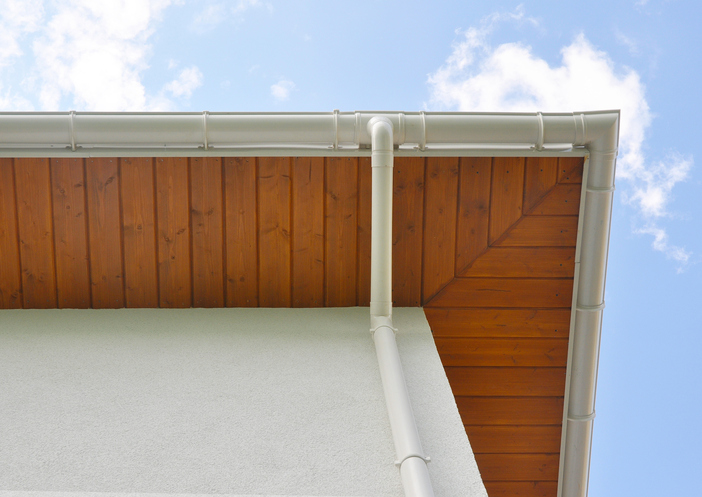
Is it Worth it to Install Vinyl Gutters?
While there are several benefits to vinyl gutters being lightweight, the feature also comes with some drawbacks. The material can bend, crack, or sag during extreme weather conditions, such as high temperatures and heavy rain, snow, or winds. Vinyl gutters can also become brittle in extremely cold temperatures—all of which decrease their lifespan.
Part of this is due to the fact that PVC plastic is unable to support heavyweight loads over time. This issue can worsen with sectional gutters since they use seams. When strained with heavyweight, these seams can pull apart and cause leaks.
The low cost of vinyl gutters makes them a popular option for DIYers and homeowners on a tight budget. But because of their shorter lifespan and low durability, most professional contractors do not recommend the material—and some installers will not work with the material.
Installing Downspouts and Gutter Guards
As mentioned earlier in this article, there are several gutter accessories that homeowners can (and should strongly consider) installing.
The first of these is a gutter downspout, which is the tube that connects to the gutter at the roof’s edge and runs down the side of your home. This allows water to efficiently flow away from your house—which goes a long way toward preventing structural damage. In fact, without downspouts, gallons of water from heavy rainfalls and melted snow and ice would accumulate near the foundation of your home, leading to flooding (and serious harm to your basement, if you have one).
The second is gutter guards. Many homeowners are familiar with the fact that gutters tend to collect large amounts of debris, precipitation, dirt, and other outdoor muck. This is where gutter guards come into play. They help to alleviate the issue of clogged gutters and can effectively divert rainwater away from your home and keep it better protected.
Gutter guards function as coverings that are equipped with small holes. This allows water to pour into the gutter and out the downspouts, while preventing larger debris from becoming trapped and preventing water flow. They can be used on virtually any type of gutter system, including both sectional and seamless gutters.
There are several gutter guard options available to meet different needs and budgets. Keep in mind that most roofing and gutter experts agree that gutter guards are not 100% effective. However, they can do a great deal to help prevent dangerous clogs and gutter replacements and save homeowners from tons of unnecessary maintenance.
Finding a Reliable Gutter Professional
A gutter installer can help you explore the best options for your home, as well as your budget. Be sure to investigate whether or not you want a short-term DIY solution or a long-lasting professional solution that will protect your gutter system for years to come.
The pros at Modernize have compiled a contractor checklist to make hiring a gutter contractor easy. We can also connect you with trusted, local gutter professionals who can help you with your vinyl gutter installation.
Compare top-rated gutters pros in your area.
Read real homeowner reviews, explore qualifications, and view promotions. Modernize makes it easy to browse professionals and find one that will be perfect for your project.







